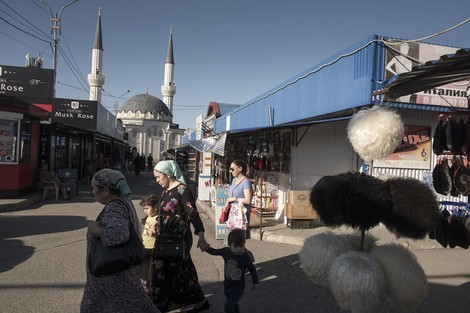Your podcast discovery platform
Curious minds select the most fascinating podcasts from around the world. Discover hand-piqd audio recommendations on your favorite topics.

piqer for: Globalization and politics Global finds
Neil Hauer is an independent analyst focused on Syria, Russia, and the Caucasus. Based in Tbilisi, Georgia, he served as senior intelligence analyst at The SecDev Group, an Ottawa-based geopolitical risk consultancy, for three years. He is presently engaged primarily on Russia’s role in the Syrian conflict.
Forgiven By Her Native Chechnya, A Woman Is Returned From The Islamic State
The story of the foreign wives, particularly the Russian-speaking ones, of Islamic State foreign fighters has been a fascinating one. It appears as though Chechnya has become one of the places most eager to repatriate its jihadi emigre women and children, though details are still scant. Amie Ferris-Rotman provides a scintillating look into the life of one of the returnees there.
Madina's life, like that of many Chechens, has been filled with turmoil over the past two decades. Having lived in the Netherlands since fleeing her homeland in the late 1990s, she has since given birth to seven children by three different husbands. The last of these is the most interesting: a Tunisian man who brought her with him to join the Islamic State's then-growing caliphate in Syria.
Her life in Syria was a quiet one. Like most wives of foreign fighters, she lived largely unseen and unheard, tending to the family and the home and rarely venturing outdoors, while her husband was away at war. In her short time there, she gave birth to two children, and was pregnant with another when she and her family were captured.
Her seizure by the US-backed Syrian Democratic Forces was followed by an unexpected trip home, arranged by Chechen authorities as part of a wide-ranging amnesty. Madina now lives in an old apartment block on the edge of Grozny, the Chechen capital. She and her husband, also captured in Syria, do not speak.
There remain many questions about the exact nature of the Chechen government's repatriation campaign. It seems unlikely, to say the least, that an administration that regularly practices collective punishment and summary execution is interested in the present operation purely for humanitarian reasons. There have been rumours that the program is a cover for extracting Chechen government agents who were secretly embedded with IS. There is also no information about what exactly happens with returnees once they are home. Hopefully, future pieces will answer these questions.
